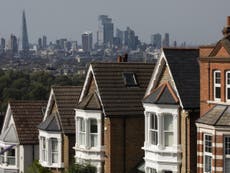Government urged to extend eviction ban to avoid ‘cliff-edge’ for renters
‘I believe the government should not lift the ban until they’ve got a credible for how to make sure people do not lose their homes because of coronavirus,’ says shadow housing secretary

Labour is demanding the government perform an eleventh-hour U-turn and extend the eviction moratorium until they have a “credible” plan to ensure people do not lose their homes as a result of the pandemic.
With just six days remaining until courts can once again begin procession proceedings, shadow housing secretary Thangam Debbonaire warned of a “cliff-edge” facing thousands in the rental sector.
Her comments came after Robert Jenrick, the communities secretary, announced a brief extension to the reprieve on evictions until 20 September, following intense pressure from homelessness charities and opposition parties.
In an attempt to alleviate concerns over the imminent lifting of the ban, the government extended the notice period for renters are given to leave a property from three to six months, excluding cases involving anti-social tenants.
Last week, the Ministry of Housing, Communities and Local Government (MHCLG) also said evictions will not be enforced in areas where local lockdowns have been imposed, and announced a “truce on enforcement” over Christmas.
While welcoming the measures that would prevent the “misery” of tenants facing eviction over the festive period, charity Shelter warned those people who were served notices by landlords before August could “still face automatic eviction when the moratorium expires”.
The organisation has previously warned that 174,000 tenants were threatened with eviction by landlords or letting agents by the end of June.
“And for renters served notice after August, the measures simply delay the threat of homelessness,” they added. “With the double-whammy of recession and the furlough scheme ending next month, and thousands in financial peril, the government must support the renters most in need with paying their rent.”
Ahead of the resumption of courts hearing eviction cases, Ms Debbonaire told a roundtable discussion on Tuesday: “We have been warning the government for months about the potential rise in homelessness if they lift this ban without a plan.”
Echoing Shelter’s comments, the Labour MP said extending eviction notice periods to six months, from three, “doesn’t help people who were served notice before August”.
She added: “Unfortunately the government has in my view been far too slow. The government did U-turn at the last minute last month and they brought in this very short extension. This was welcomed, but in my view they’ve wasted that time and we’re still facing largely the same cliff-edge this Sunday that the government narrowly avoided at the end of August.
“I believe the government should not lift the ban until they’ve got a credible for how to make sure people do not lose their homes because of coronavirus.”
One tenant, speaking on the condition of anonymity at the roundtable discussion hosted by campaigning group Generation Rent, said that just before the pandemic hit they were made redundant and had enough money to cover just the first rental payment of the lockdown.
“After that I had to tell my landlady that look I’m only going to be able to cover what the government gives me – and the government gives me less than a third of what my rent is, which is just below the market rate in south-east London.
“I’ve been paying that since, but I’ve gone into arrears of a few thousand pounds now. I’ve been looking for work but because of the Covid situation it’s a lot tougher now. I’ve also got mental health issues and it’s really impacted my anxiety severely.
He added: “I wanted the government to say, even temporarily while this crisis is going on, we will actually cover the market rate of the rent.”
“At the moment it’s extremely tough and it’s having a real impact. Luckily, I haven’t had an eviction notice or anything yet, unlike some others. But you never know when that comes through – once that comes through it’s the end game because I’ve got nowhere else to go.”
A second tenant on Tuesday afternoon urged the government to extend the eviction ban amid rising cases of coronavirus and fears of the UK is experiencing a second wave of the pandemic. While the renter said they had not received an eviction note, the landlord was consistently asking whether they have “found another property”.
“Everytime he sees me, everytime he sends me a text: ‘You find another property’. Although he didn’t send me an eviction note, it’s not good to live under that pressure."
A third tenant speaking at the roundtable, who lives in an east-London block, said they had been served a section 21 notice by their landlord, dated for 21 September – the day after the moratorium on evictions ceases in England and Wales.
“A lot of people in the building are young freelancers, people working in the gig economy. So the Covid crisis hit us in a particular way, with lots of people loosing income, including my partner, who shares the rent with me,” the tenant said.
In an attempt to alleviate financial pressures, tenants in the building wrote a letter to the landlord asking for a rental discount during the crisis, “or at least a guarantee that no-one evicted if they couldn’t pay”.
They added: “We were very surprised at the response we got. The letter received said we were supposedly saving money on cancelled holidays and lunches… that we could use to pay the rent in full. So, we received no discount whatsoever.”
The National Residential Landlords Association, which has previously called for government support for those suffering rent arrears, however, urged the government to “keep its word and ensure that urgent repossession cases can be heard again after 20 September”.
They added: “We need the courts to deal with cases where tenants are committing anti-social behaviour or where there are long-standing rent arrears that have nothing to do with the pandemic. Over the last six months landlords have been powerless to take any action against those who cause misery for fellow tenants and neighbours. This has to end.”
Speaking last week, Mr Jenrick said: “We have protected renters during the pandemic by banning evictions for six months – the longest eviction ban in the UK. To further support renters we have increased notice period to six months, and unprecedented measure to help keep people in their homes over the winter months.
“It is right that we strike a balance between protecting vulnerable renters and ensuring landlords whose tenants have behaved illegally or anti-social ways have access to justice. Our legislation means such cases will be subject to shorter notice periods and then prioritised through the judiciary’s new court processes.”





Join our commenting forum
Join thought-provoking conversations, follow other Independent readers and see their replies
Comments